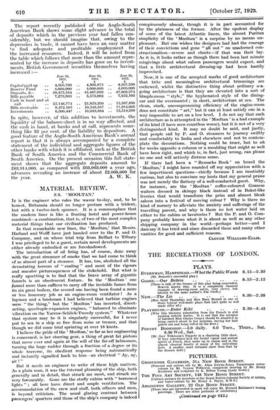MATERIAL REVIEW.
S S. MOOLTAN: IT is the engineer who rules the waves .to-day, and, to be honest, Britannia should no longer posture with a trident, but with a twelve-inch spanner. It is a commonplace that the modern liner is like a floating hotel and power-house combined—a combination, that is, of two of the most complex material things that our civilization has produced.
In that remarkable new liner, the Mooltan,' that Messrs. Harland and Wolff have just handed over to the P. and 0. Company, and on whose trial trip from Belfast to Tilbury I was privileged to be a guest, certain novel developments are either already embodied or are foreshadowed.
The introduction of oil firing has, of course, done away with the great streamer of smoke that we had come to think of as almost part of a steamer. It has, too, abolished all the devastating horrors of " coaling " and most of the rigours and macabre picturesqueness of the stokehold. But what is really upsetting is to find that the brave array of gigantic funnels is an obsolescent feature. In the Mooltan ' one Simnel more than suffices to carry off the invisible fumes from its six great boilers, the second one having been found a more or less honorary job as an engine-room ventilator ! As a layman and a landsman I had believed that turbine engines were " the thing," but the Mooltan ' has inverted, direct- acting, quadruple-expansion engines, " balanced to eliminate vibration on the Yarrow-Schlick-Tweedy system." Whatever that system may be it is singularly successful, for I never put to sea in a ship so free from noise or tremor, and that though we did some trial sprinting at over 18-knots.
I believe the pride of the ` Mooltan,' so far as her engineering is concerned, is her steering gear, a thing of great fat pistons that move ever and again at the will of the far-off helmsman, turning the huge rudder through a fraction of a degree or its whole traverse, its obedient response being automatically and instantly signalled back to him—an electrical " Ay, ay, fjir ! "
But it needs an engineer to write of these high matters.
As a plain man; it was the internal planning of the ship; both generally and in detail, that struck me most, and struck me very fa.eourably. Gone are the stuffy cabins with " borrowed lights " ; all here have direct and ample ventilation. The accommodation of the crew and staff, both officers and men, is beyond criticism. The usual glaring contrast between passengers' quarters and those of the. ship's company is indeed conspicuously absent, though it is in part accounted for by the plainness of the former. After the opulent display of some of the latest Atlantic liners, the almost Puritan simplicity of the ` Mooltary1 is a surprise by no means un- pleasant. But one wishes the designers had had the courage of their convictions and gone "all out " on unadorned con- structionalism—severe and chaste-if that was their lay. As it is, it looks rather as though there had been last minute misgivings about what saloon passengers would expect. and that a little architectural dressing-up had been hastily improvised.
Now, it is one of the accepted marks of good architecture that trite and meaningless architectural trimmings are eschewed, whilst the distinctive thing about ordinary sag- going architecture is that they are elevated into a sort of blasphemous " style," the hyphenated style of the dining- car and the overmantel ; in short, architecture at sea. The clean, stark, uncompromising efficiency of the engine-room does not constitute " art," but it can at least satisfy one in a way impossible to art on a low level. I do not say that such architecture as is attempted in the ` Mooltan ' is a bad example of its kind (I have seen countless worse), but it is not of a very distinguished kind. It may no doubt be said, and justly, that people sail by P. and 0. steamers to journey swiftly and comfortably to India and elsewhere and not to contem- plate the decorations. Nothing could be. truer, but to sit for weeks opposite a column or a moulding that might as well have been right, and which is, in fact, just wrong, can please no one and will actively distress some.
If there had been a " Remarks Book' on board the Mooltan,' I might have rounded off my appreciation with a few impertinent questions—chiefly because I am insatiably curious, but also to convince my hosts that my general praise was not merely the flattery of a well-conducted guest. Why, for instance, are the ` Mooltan ' coffee-coloured Goanese waiters dressed in skimpy black instead of in Bakst-like liveries that would transform the prim and almost bleak saloon into a festival of moving colour ? Why is there no kind of nursery to alleviate the anxiety and sufferings of the travelling parent, and why is there no hot water laid on either to the cabins or lavatories ? But the P. and 0. Com- pany probably knows what it is about as well as any other shipping company in the world—perhaps better—and I dare say it has tried and since discarded these and many other vanities for good and sufficient reasons.
CLOUGH WILLIAMS-ELLIS.














































 Previous page
Previous page